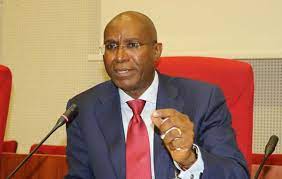Senate on Thursday explained that it will be difficult for Nigeria to have an entirely new constitution as being canvassed by many Nigerians including socio-cultural organisations across the country.
It specifically said such a move would be unconstitutional and amounts to a violation of the provisions of the 1999 Constitution.
Deputy Senate President and Chairman of the Constitution Review, Senator Ovie Omo-Agege, stated this on Thursday at a national public hearing on the alteration to the provisions of the 1999 Constitution in Abuja.http://scudnewsng.com
The Senate position is coming when many Nigerians including governors and socio-cultural organisations are drumming for an entirely new constitution.
But Omo-Agege, addressing the gathering, explained that the ongoing Constitution review is in line with extant legal order as provided by the current Constitution.
“Now, some of our compatriots have urged that rather than amending the Constitution, we should make a new Constitution altogether. We respect this opinion, and we believe it is the most desirable proposition.
“However, we are conducting this exercise in accordance with the extant legal order, which is the 1999 Constitution.
“Specifically, Section 9 of the Constitution empowers the National Assembly to alter the provisions of the Constitution and prescribes the manner in which it is to be done.
“Unfortunately, it does not make similar provision or provide a mechanism for replacing or re-writing an entirely new Constitution”, he said.
The Deputy Senate President added that Section 9 of the Constitution had to be amended before Nigerians could advocate for a new Constitution.
According to him, “To embark on any process without prior alteration of Section 9 of the Constitution to provide the mode through which an entirely new Constitution could be made, would amount to gross violation of our oath of allegiance to the Constitution.
“In other words, it will take a new Constitutional amendment to be able to give Nigerians a most desired new Constitution. It would be unconstitutional to do otherwise.”

